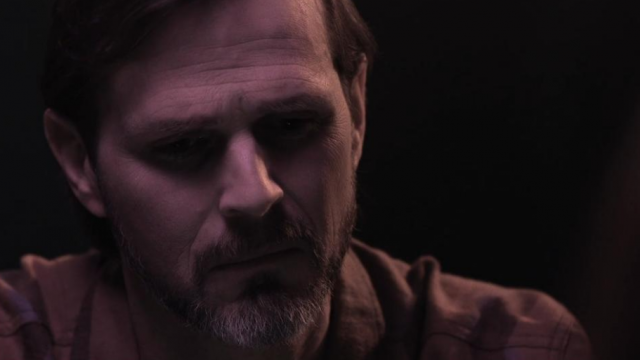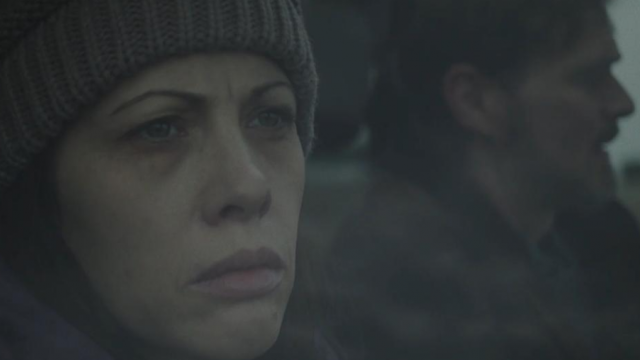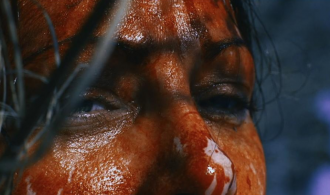Over the years, there have been plenty of films that have successfully mixed horror with drama. Now classic titles like Rosemary’s Baby, The Silence of the Lambs, and The Sixth Sense have all done this to much acclaim. There’s a fine line that a filmmaker must toe to successfully pull off this mix of genres but it can be done. Writer/director Mitch McLeod takes this very approach with his new micro-budget feature, Silhouette, to varying degrees of success. While both the horror and dramatic sides of his film are done well individually, they’re a little too divided to make one cohesive product.
The film follows a woman named Amanda Harms (April Hartman) and her husband, Jack (Tom Zembrod), as they attempt to get their lives back on track. Amanda deals with crippling depression following the loss of their daughter, Sarah (Savannah Solsbery). Jack is often distant but tries to return to some sort of normalcy with his wife. The couple move to a secluded house as an attempt to start fresh. However, Amanda begins having visions of her daughter and realizes that something malevolent may be haunting her in the wake of tragedy.
This type of plot is nothing new for either horror or drama. On paper, it most closely resembles the plot of Lars von Trier’s 2009 film, Antichrist. However, while Antichrist basks in excessive sexual violence and irritatingly typical von Trier tropes, Silhouette largely focuses on family drama. In fact, despite its very horror-esque opening sequence, the film often largely ignores horror. Much of the story focuses on the diminishing relationship between Amanda and Jack and their ill-fated attempts to regain a semblance of happiness. It doesn’t help that Jack has had a checkered past in regards to being faithful either. Both characters try to rekindle their relationship but , instead, are driven farther apart throughout the course of the film.

Speaking of the characters, Mitch McLeod puts his story entirely on the shoulders of his lead actors. Tom Zembrod’s Jack probably has the biggest character arc throughout the film as he holds a lot of emotion inside while his wife struggles externally. As Silhouette progresses, Zembrod is thrust more into the spotlight and Jack becomes more essential to the story. However, it’s April Hartman as Amanda who’s the biggest standout. She’s the emotional crux of the film as she can’t seem to come to grips with reality. You constantly question her visions and nightmares but have no doubt that they’re real in her mind. As the film continues, you learn more about the events that led the couple to this point and the emotional toll it has taken on Amanda. Hartman portrays the grieving, yet unhinged, mother perfectly and is the driving force of the film.
Much of what makes Hartman’s performance so effective are the quality thrills and chills throughout Silhouette. While it’s true that there aren’t a ton of them, what is here is great. McLeod displays deliberate pacing with this film that accentuates atmosphere and mood. Amanda’s visions are effectively eerie as she follows her deceased daughter through the house while seeking some sort of closure. Of course, she’s also emotionally and mentally tortured by something more evil as well. There’s some superb imagery during these sequences and the location and hazy cinematography emphasize it. The film isn’t especially scary but it has a ghostly and uncomfortable feel to it. Again, it’s reminiscent of Antichrist mixed with something like 2017’s A Ghost Story.

Unfortunately, this is what makes Silhouette fall somewhat short as well. Both Antichrist and A Ghost Story had something of a consistent tone throughout their respective runtimes. Here though, Silhouette can’t seem to fully decide what it wants to be. For this, it feels like a tale of two films. On one hand, you have the horror/thriller aspect that’s done really well and holds your interest. Then, on the other, you have the family drama between Amanda and Jack that’s also compelling. It’s not that the film does either poorly. It’s just that it feels like there were two different directions the film could go and both got shoehorned in. This is especially the case with a bar scene between Zembrod’s Jack and a neighbor woman named Dawn (Jessica Dawn Willis) that feels completely out of place in a horror film.
Overall, Mitch McLeod proves his storytelling and filmmaking abilities with Silhouette. If you’re interested in either horror or drama, you should be able to find something you like with the film. Though, as a complete experience, it lacks only because of its mildly schizophrenic tone. Another film that comes to mind here is Darren Aronofsky’s mother! in which horror and drama are mixed to perfection. In that film, the plot starts out with mostly drama and descends into someone’s worst nightmare. It’s as if Silhouette does the opposite here and seems to come up short because of it. Had viewers experienced all the relationship woes first, there may have been a better understanding for Amanda’s torment and psychotic break. Regardless, Silhouette is certainly worth a watch due to its technical competence, strong character work, and directorial vision.




